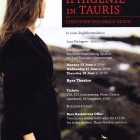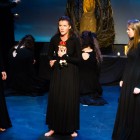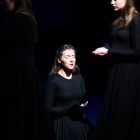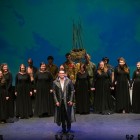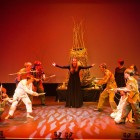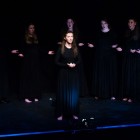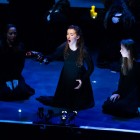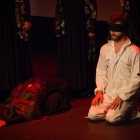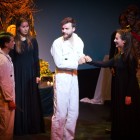Iphigenia in Tauris 2015Byre Opera
Read more about the opera Iphigénie en Tauride
Performances in Scotland of Iphigenia in Tauris have been scarce. While it is far from being Gluck's most popular opera, it may well be his best, building a superb degree of dramatic tension by means of some gloriously eloquent melodies. It has been brought to the Edinburgh International Festival by guest companies on three occasions. However, the only previous staging to originate in Scotland was Erik Chisholm's production with the Barony Musical Association in 1937 at the Glasgow Lyric. OperaScotland's archivist is trying to source full details.
This work presents a huge challenge for Byre Opera, as St Andrews Opera has been renamed, and the orchestral forces brought in show without doubt the seriousness of their approach. Michael Downes conducted with a fine sense of flair, and the wonderful storm music in the opening scene was put across with thrilling vigour. This was one of the few points when the band, which overflowed from the tiny pit, threatened to overwhelm the singers, but the impressive sound and lighting made that worthwhile. Most of the music is subtle, with many points where Mozart's Magic Flute - several years in the future - is brought to mind.
The singers reached a remarkably high standard. The only non-student among the soloists was Andrew McTaggart, who, as Thoas, was comfortably able to project his more mature and powerful voice in the Byre. The others managed perfectly well and these young singers, under the canny conductor's guidance, had the good sense not to force their voices. Iphigénie is rarely off the stage and has several quite demanding arias to project. Caroline Taylor sang with sweet and lyrical tone that worked very well. Ranald McCusker's light baritone was also well projected. The high lying tenor line often given to Pylade caused no problems for Chris Huggon, though he was stretched to the limit by the heroic climax to his final aria. The women choristers produced some beautiful soft lyrical tone, and the two solo sopranos made their words tell effectively. The same was true of the smaller men's grouping, with some vigorous 'barbaric' chorus work They were effectively led by Graham Dalton as the Scythian warrior (here described simply, but quite adequately, as a henchman).
Jane Pettegree's direction did all required of it, with well-placed chorus groupings and movement. Stage settings were plain with a highly impressive storm effect cyclorama (Sound and AV by David Venters and Pieter Macmillan). The set included a permanent wickerwork centrepiece by Jon Warnes and wood carvings by Don Ryan. The costumes were effective, chosen from Scottish Opera's extensive wardrobe, with flowing black draperies for the women and quasi-military fatigues for the men - Thoas in a fascistic-looking raincoat while the prisoners were in boiler-suits. The movement direction introduced elements suggesting folk-dances from Asia Minor, and that worked well in the confined space of the Byre stage.
Another great success was the new English singing translation used. This was prepared by a group of seventeen students as part of a specialist module on which they collaborated. This was prepared under the leadership, perhaps co-ordination could be an appropriate term, of their tutor, Julia Prest. She, and several of the students, were there on stage trying it out for themselves. It really worked very well - the words fitted the musical line, and all the singers managed to project the sense. There were no awkward modernisms or overused antique expressions, and it all flowed well.
Surely we won't have have to wait eighty years before another Scottish company produces this superb music drama.
Prices: £16; (£12 Concessions and Music Centre members); £6 Students and U026.
Performance Cast
- Iphigénie Priestess of Diana
- First Priestess
- Second Priestess
- Thoas King of Tauris
- Scythian
- Oreste son of Agamemnon
- Pylade friend to Oreste
- Voice of Diana
Production Cast
- Conductor
- Director
-
Jonathan May (Assistant)
Andrew McTaggart (Assistant)
- Designer - Sets
- Designer - Costumes
- Lighting
-
Callum Noble (Assistant)
- Choreography
- Orchestra
- Translator
